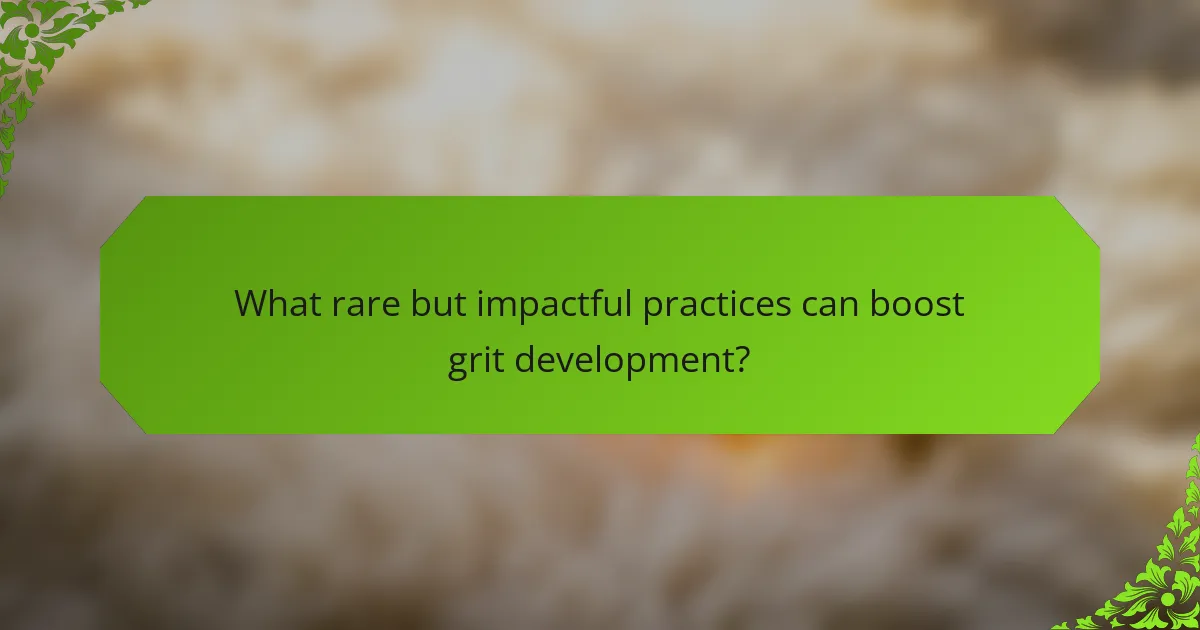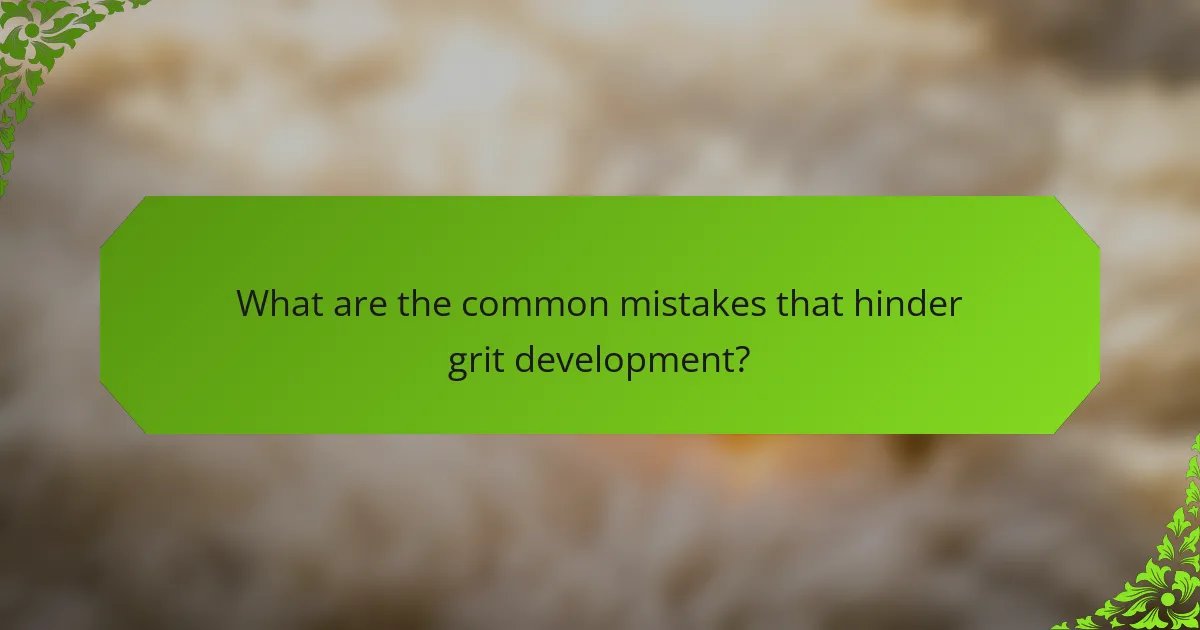Developing grit is essential for athletes aiming to enhance their mental toughness, focus, and perseverance. This article explores key strategies such as goal setting, consistent practice, and positive self-talk. It also highlights the importance of resilience training and creating a supportive environment. By implementing these techniques, athletes can cultivate the mental strength needed to overcome challenges and achieve long-term success.

What are the key components of grit development for amateur athletes?
Grit development for amateur athletes focuses on cultivating resilience, dedication, and mental strength. Key components include goal setting, consistent practice, and positive self-talk.
Goal setting involves establishing clear, achievable objectives that motivate athletes. Consistent practice enhances skills and builds confidence, reinforcing the commitment to improvement. Positive self-talk fosters a growth mindset, helping athletes navigate challenges and setbacks effectively.
Additionally, seeking feedback from coaches and peers can provide valuable insights, further enhancing perseverance and focus. These strategies collectively contribute to the overall development of grit in amateur athletes.
How does mental toughness influence athletic performance?
Mental toughness significantly enhances athletic performance by fostering resilience, focus, and perseverance. Athletes with high mental toughness can better manage stress and maintain composure under pressure. This ability leads to improved decision-making and consistency during competitions. Research indicates that mentally tough athletes often outperform their peers, especially in high-stakes situations. Developing grit through specific strategies, such as goal-setting and visualization, can further strengthen this attribute, ultimately contributing to superior athletic outcomes.
What role does focus play in achieving athletic goals?
Focus is crucial for athletes to achieve their goals, as it enhances performance and resilience. It allows athletes to concentrate on their training and competition, minimizing distractions. Developing focus through grit strategies, such as setting clear objectives and practicing mindfulness, fosters mental toughness. As a result, athletes can maintain perseverance, even in challenging situations, leading to improved outcomes and goal attainment.
Why is perseverance essential for success in sports?
Perseverance is crucial for success in sports because it enables athletes to overcome challenges and setbacks. Grit development strategies enhance mental toughness, focus, and resilience, allowing athletes to persist despite difficulties. Research shows that athletes with higher perseverance levels achieve better performance outcomes. For instance, a study found that perseverance correlates with improved training consistency and competition results. By fostering perseverance, athletes can maintain motivation and commitment, ultimately leading to greater success in their sports careers.

What universal practices can enhance resilience in athletes?
Developing grit enhances resilience in athletes through intentional practices. Key strategies include setting specific goals, fostering a growth mindset, and embracing challenges.
1. Set Specific Goals: Clear, measurable objectives provide direction and motivation.
2. Foster a Growth Mindset: Embrace learning from failures and view setbacks as opportunities for growth.
3. Embrace Challenges: Actively seek difficult tasks to build confidence and adaptability.
4. Cultivate Focus: Use techniques like mindfulness to improve concentration during training and competition.
5. Practice Perseverance: Consistent effort over time reinforces mental toughness and resilience.
These practices collectively strengthen mental toughness, focus, and perseverance in athletes.
How can goal setting improve grit and resilience?
Goal setting enhances grit and resilience by providing clear objectives and a sense of purpose. It fosters focus, enabling athletes to overcome challenges and maintain motivation. Specific, measurable goals encourage perseverance, reinforcing mental toughness through consistent effort. Research shows that athletes who set goals experience greater resilience in the face of setbacks, ultimately leading to improved performance and personal growth.
What are effective visualization techniques for athletes?
Visualization techniques enhance mental toughness and focus in athletes. Effective methods include mental imagery, video analysis, and goal visualization.
Mental imagery involves athletes picturing themselves executing skills successfully, which boosts confidence and performance. Video analysis allows athletes to review their techniques, identifying areas for improvement and reinforcing correct movements. Goal visualization helps athletes mentally rehearse achieving their objectives, fostering perseverance and commitment to training.
These techniques contribute to grit development by strengthening focus, enhancing mental resilience, and promoting a growth mindset.
How does positive self-talk impact performance?
Positive self-talk significantly enhances athletic performance by fostering mental resilience and focus. It encourages a growth mindset, helping athletes overcome challenges. Research indicates that athletes who engage in positive self-talk experience improved motivation, reduced anxiety, and better overall performance. This psychological strategy is essential for grit development, enabling athletes to persevere through adversity and maintain concentration during competitions.

What unique strategies can foster grit in amateur athletes?
To foster grit in amateur athletes, implement strategies that enhance mental toughness, focus, and perseverance. Techniques include goal-setting, positive self-talk, and resilience training.
1. Set specific, measurable goals to provide direction and motivation.
2. Encourage positive self-talk to build confidence and combat negative thoughts.
3. Incorporate resilience training to help athletes recover from setbacks.
4. Foster a supportive environment that emphasizes effort over outcome.
5. Use visualization techniques to enhance focus and mental preparation.
6. Encourage a growth mindset to view challenges as opportunities for development.
How can learning from failure build mental toughness?
Learning from failure enhances mental toughness by fostering resilience and adaptability. Athletes who analyze setbacks develop a growth mindset, which promotes perseverance. This process involves reflecting on mistakes, setting new goals, and implementing strategies to overcome challenges. As a result, they build grit, enabling them to push through adversity and maintain focus during competition.
What is the importance of grit in team sports?
Grit is crucial in team sports as it enhances resilience, focus, and perseverance among athletes. Developing grit fosters a strong work ethic, enabling players to overcome challenges and maintain motivation. Teams with gritty athletes often exhibit higher performance levels, particularly in high-pressure situations. Research indicates that grit can lead to improved teamwork and collaboration, as players support each other in pursuing common goals. By implementing grit development strategies, teams can cultivate a culture of mental toughness that drives success.
How can mentorship enhance resilience in young athletes?
Mentorship significantly enhances resilience in young athletes by providing guidance, support, and motivation. Mentors can share experiences that foster mental toughness, helping athletes navigate challenges. This relationship encourages focus, builds perseverance, and instills a growth mindset. Studies show that athletes with mentors demonstrate higher resilience and improved performance. By fostering a supportive environment, mentors can help athletes develop grit, a unique attribute essential for long-term success in sports.

What rare but impactful practices can boost grit development?
Engaging in rare but impactful practices can significantly enhance grit development in athletes. Techniques such as visualization, where athletes mentally rehearse their performance, can increase focus and resilience. Another effective practice is deliberate practice, which involves pushing beyond comfort zones to foster perseverance. Additionally, fostering a growth mindset encourages athletes to view challenges as opportunities for improvement, thus strengthening their mental toughness.
How does engaging in cross-training contribute to mental resilience?
Engaging in cross-training enhances mental resilience by promoting adaptability and reducing burnout. It exposes athletes to diverse challenges, fostering problem-solving skills and mental flexibility. This variety builds grit, a unique attribute linked to perseverance and focus. Studies show that athletes who cross-train report improved confidence and reduced anxiety levels, contributing to their overall mental toughness. By integrating different training modalities, athletes can maintain motivation and sustain performance over time.
What are the benefits of participating in challenging competitions?
Participating in challenging competitions fosters grit, enhancing mental toughness, focus, and perseverance. Athletes develop resilience through overcoming obstacles, which translates into improved performance. Engaging in high-pressure environments cultivates adaptability, allowing athletes to excel under stress. Moreover, competition encourages goal-setting and accountability, driving continuous improvement. These experiences build confidence, reinforcing a positive mindset essential for long-term success.
How does community support influence grit in athletes?
Community support significantly enhances grit in athletes by providing emotional resources and accountability. This support fosters resilience, encouraging athletes to persevere through challenges. Studies show that athletes with strong community ties display higher levels of mental toughness and focus, essential traits for achieving long-term goals. Furthermore, the collective encouragement from peers can create a positive feedback loop, reinforcing determination and sustained effort.

What are the common mistakes that hinder grit development?
Common mistakes that hinder grit development include a lack of clear goals, inconsistent practice, and negative self-talk. Athletes often fail to set specific, measurable objectives, which impedes focus and commitment. Inconsistent training routines can lead to diminished perseverance, as athletes may not fully develop their mental toughness. Additionally, negative self-talk undermines confidence and resilience, making it difficult to overcome challenges. Recognizing and addressing these mistakes is crucial for fostering grit and achieving long-term success in sports.
How can overtraining affect mental toughness?
Overtraining can significantly diminish mental toughness by causing fatigue, anxiety, and decreased motivation. This condition disrupts focus and perseverance, essential traits for athletes. Symptoms like irritability and mood swings further hinder grit development. Addressing overtraining through balanced training and recovery strategies is crucial for maintaining mental resilience.
What misconceptions about grit should athletes avoid?
Athletes should avoid the misconception that grit is solely about relentless effort. Grit encompasses focus, resilience, and adaptability. Many believe that grit means pushing through pain without considering recovery or strategy. This can lead to burnout and injuries. Additionally, some think grit is innate; however, it can be developed through practice and mindset shifts. Misunderstanding grit can hinder an athlete’s performance and growth. Emphasizing a balanced approach to grit will foster long-term success and mental toughness.

What actionable tips can athletes implement for immediate grit improvement?
Athletes can improve grit through focused strategies such as setting specific goals, practicing resilience in training, and cultivating a growth mindset. These actionable tips enhance mental toughness and perseverance.
1. Set clear, achievable goals to maintain motivation.
2. Embrace challenges by viewing failures as learning opportunities.
3. Develop a routine that includes mental conditioning practices.
4. Engage in visualization techniques to enhance focus and determination.
5. Foster a supportive environment with peers and mentors who encourage grit.
6. Reflect regularly on progress to reinforce commitment and resilience.
How can athletes create a personalized grit development plan?
Athletes can create a personalized grit development plan by assessing their mental strengths, setting specific goals, and incorporating consistent practice. Begin with a self-assessment to identify areas for improvement, such as resilience or focus. Next, establish measurable objectives that align with personal aspirations. Incorporate daily routines that include mental exercises, visualization, and reflection to build perseverance. Regularly review progress and adjust the plan to ensure continuous growth and adaptation.
What daily habits can strengthen resilience over time?
Daily habits that can strengthen resilience include setting specific goals, practicing mindfulness, maintaining a consistent training schedule, and engaging in self-reflection. Each habit contributes to grit development by enhancing mental toughness and focus. For example, goal-setting helps athletes stay motivated and track progress. Mindfulness reduces stress, allowing for better concentration during training. A consistent training schedule fosters discipline, while self-reflection encourages learning from experiences. Over time, these habits build perseverance, a unique attribute essential for athletic success.
How can athletes track their progress in developing grit?
Athletes can track their progress in developing grit by setting measurable goals and reflecting on their experiences. Regular self-assessments help identify growth in mental toughness, focus, and perseverance. Utilizing journals to document challenges and responses provides insights into resilience. Additionally, seeking feedback from coaches can highlight areas for improvement and reinforce commitment to grit development.



